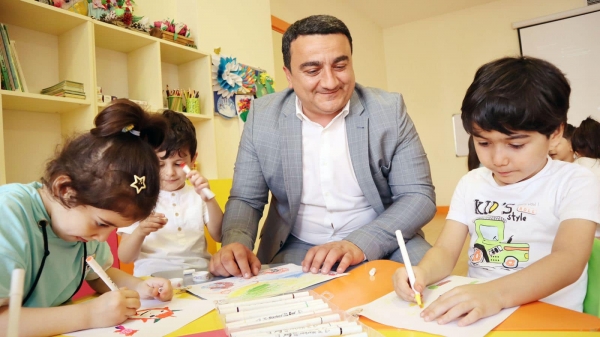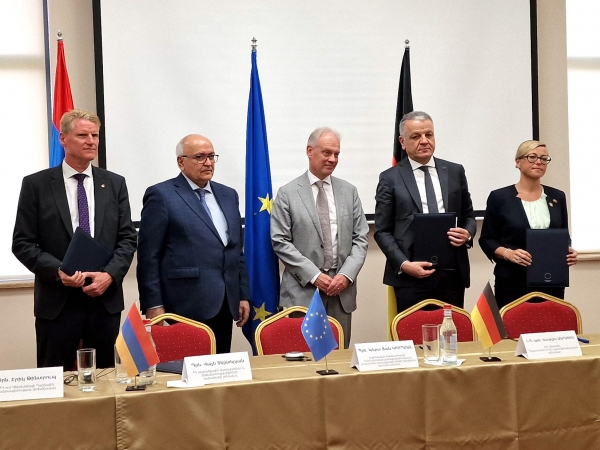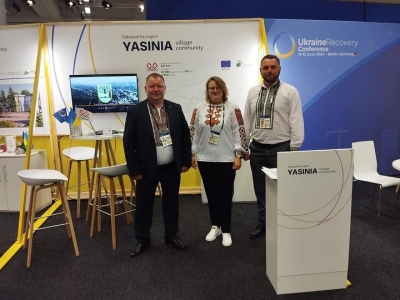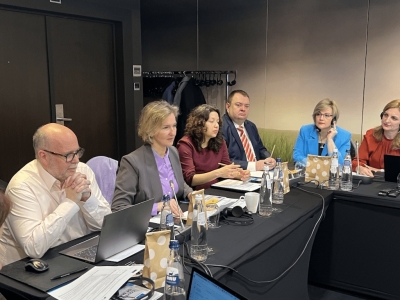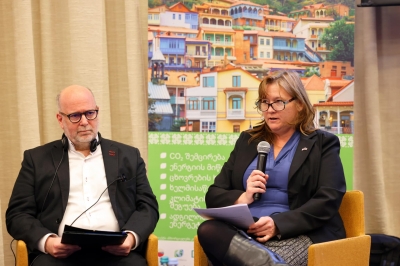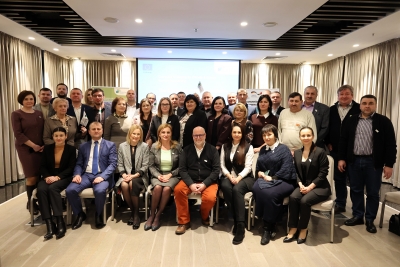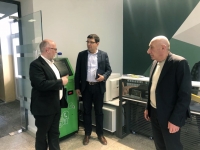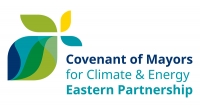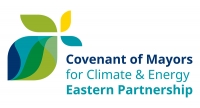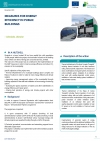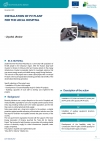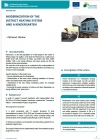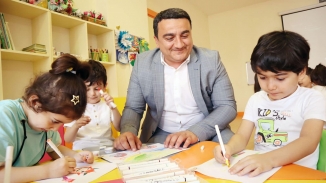
Azerbaijan embraces sustainable future with inaugural Energy Week
Azerbaijan held its first-ever Sustainable Energy Week, marking a significant milestone in its commitment to environmental stewardship and sustainable development. This nationwide initiative, aligned with Azerbaijan's declaration of 2024 as the Green World Solidarity Year, saw engaging events across multiple cities, fostering awareness and action on sustainable energy practices.
Khirdalan Takes Center Stage in Energy Innovation
The city of Khirdalan emerged as a focal point for sustainable energy promotion:
- Youth Engagement: On June 11, 2024, a compelling photo competition exhibition titled "Sustainable Energy" showcased the creative works of 20 students from five local schools. This event, held in collaboration with the Covenant of Mayors-East, aimed to inspire young minds to envision a sustainable future.
- Early Education: The following day witnessed an Interactive Kindergarten event at West Kids Place, where ecologist Ms. Ayshan Damirli from Ekosfera Environmental and Social Centre introduced 5-6-year-olds to environmental protection and energy efficiency concepts through age-appropriate activities.
- Technology Showcase: Heydar Aliyev Park transformed into an open-air exhibition of cutting-edge alternative energy technologies. Leading companies Helind LLC, Provitaz LLC, and SWTECH LLC demonstrated practical applications of solar panels, wind turbines, and EV charging stations, bridging the gap between innovation and everyday life.
- Business Engagement: A high-level business roundtable brought together industry leaders, academics, and environmental experts. Speakers, including Professor Nurmahammad Mammadov and Mr. Chingiz Mammadov, COP29 Advisor, highlighted the economic benefits of embracing sustainable energy solutions.
Sheki and Ganja Join the Green Movement
The energy week's reach extended beyond Khirdalan:
- Sheki: The municipality organized an educational field trip to the local Small Hydro Power Plant for Mathematics and Physics Lyceum students. This hands-on experience, led by plant head Mr. Aydin Xalilov, offered insights into renewable energy generation and the city's sustainable energy action plan.
- Ganja: On May 2, 2024, the Nizami Municipality partnered with the Covenant of Mayors for Climate and Energy to host "Energy Days" at Ganja Dunya School. The event featured a drawing competition and educational sessions on alternative energy sources and energy-saving practices.
A Sustainable Vision for Azerbaijan
This inaugural Sustainable Energy Week represents a pivotal moment in Azerbaijan's journey towards a greener future. The initiative has laid a strong foundation for ongoing dialogue and action on sustainable energy practices by engaging diverse segments of society- from schoolchildren to business leaders.
As Azerbaijan prepares to host COP29, these local efforts demonstrate the country's growing commitment to addressing global environmental challenges. The success of Sustainable Energy Week paves the way for expanded environmental initiatives and reinforces Azerbaijan's role as an emerging leader in sustainable development within the region.
Image Gallery

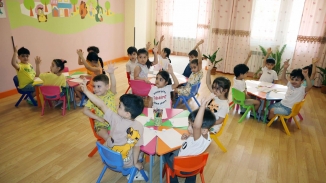
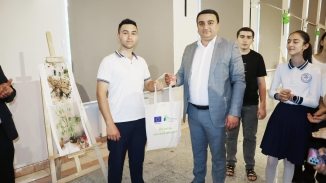
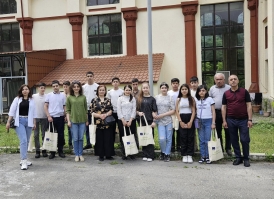
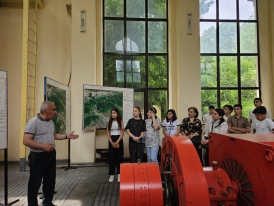
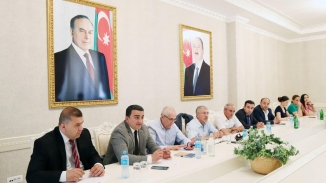
SE4Resilience: boosting renewable energy and climate adaptation in Armenian communities
On April 30th, the signing ceremony for the official launch of the "Sustainable Energy for Climate-Resilient Community Development in Armenia" (SE4Resilience) project took place in Yerevan. The three-year project aims to strengthen the climate resilience of rural communities in four regions of Armenia (Tavush, Shirak, Syunik and Gegharkunik) and contribute to climate change mitigation by harnessing the potential of renewable energy and energy efficiency for sustainable, climate-resilient and resource-efficient development.
The project will also support skills and capacity building for renewable energy and energy efficiency at household and small enterprise level.
In doing so, the program seeks to strengthen the resilience of rural communities to the effects of climate change. Through targeted interventions, the program aims to improve the capacity of rural Armenian communities to withstand and adapt to changing climate conditions. It supports Armenia's 2050 transformation strategy, which focuses on sustainable regional development and access to sustainable energy.
The project is co-financed by the European Union (6.2 million euros) and the German Federal Ministry for Economic Cooperation and Development (BMZ) (6.1 million euros) and implemented by GIZ as part of and contributing to the EU Action Document "Sustainable Energy, Energy Security and Climate Resilience in Rural Armenia" and the BMZ Core Thematic Strategy "Responsibility for our Planet - Climate and Energy.
The signing ceremony aimed to formalize the commitment and partnership between the Ministry of Territorial Administration and Infrastructure of RA (Covenant National Coordinator) and BMZ, in collaboration with GIZ and the European Union.
The event was attended by Mr. Gert Jan Koopman, Director General GH NEAR, Mr. Vache Terteryan, Deputy Minister of Territorial Administration and Infrastructures of RA, Mr. Vassilis Maragos, Ambassador, Head of the Delegation of the European Union to Armenia, Mr. Erik Tintrup, Deputy Head of the Embassy of the Federal Republic of Germany in Armenia and Mrs. Madeleine Rauschenberger, Country Director of GIZ Office Armenia.
"The objectives of the program complement the process of EU-Armenia cooperation in a number of directions, including increasing the resilience of communities to climate change. This is a very important direction, as we are increasingly faced with climate problems and their consequences." said Mr. Terteryan.
In his speech, Mr. Gert Jan Koopman stated that the launch of the project demonstrates the importance of climate resilience. which is fundamental for economic, energy, geopolitical and climate reasons.
“We are happy to support such initiative in Armenia, and we are very keen to continue doing so in the coming years. Just for the reason of illustration, let me mention some of the regional programs with similar objectives that we have been running, including EU4Energy and the “Covenant of Mayors” initiative and, of course, the Armenia’s participation in the Eastern Europe Energy Efficiency and Environment Partnership (E5P)”, said Mr. Koopman.
The welcome addresses were followed by the signing of a four-lateral cooperation agreement between the Ministry, BMZ, EU and GIZ.
Covenant of Mayors delegation participated in the Ukraine Recovery Conference 2024 in Berlin
With the support of the Covenant of Mayors - Eastern Partnership initiative, a delegation from Ukraine, including representatives from the Odesa Regional State Administration and the Yasinya community (Zakarpattia Region), took part in the third International Ukraine Recovery Conference 2024 (URC2024), which took place in Berlin on June 11-12, 2024.
The conference, themed "United in defense. United in recovery. Stronger together," brought together over 3,400 participants from governments, international organizations, financial institutions, businesses, and civil society to discuss Ukraine's post-war recovery and reconstruction efforts.
The head of the Odesa Regional Military Administration, Oleh Kiper, presented two projects aimed at boosting the region's resilience and agricultural output. The first project focuses on harnessing solar energy as an alternative power source, addressing the pressing need for sustainable energy solutions in the wake of war-damaged infrastructure. The second initiative targets the agricultural sector, introducing advanced irrigation systems to combat drought and low crop yields.
"With this technology, we can double our agricultural productivity," Kiper stated. He also signed a pivotal Memorandum of Understanding with the Italian government, securing support for the region's recovery efforts.
The head of the Yasinia community, Andriy Deliatynchuk, together with Ilona Moroziuk, head of the "Association of Enterprises and Entrepreneurs of Yasinya Valley," and Stepan Shtefuriak, head of the education, culture, youth, and sports department of the community, highlighted two critical infrastructure projects: the construction of a new school in Kvasy village and the reconstruction of a kindergarten in Yasinya town.
"These projects are vital for our community's future," Deliatynchuk explained. "They will provide safe, modern educational facilities for our children and those displaced by the conflict."
The Yasinya delegation also outlined four key areas for potential collaboration: energy efficiency, tourism development, agriculture and sheep farming, and the woodworking industry.
The conference saw the launch of the Coalition for Sustainable Cities, a joint initiative by Ukraine, Germany, and international partners. This coalition has already mobilized around 2 billion euros, half of which is earmarked for subnational authorities under the EU Mechanism for Ukraine.
Over 110 agreements were signed during the conference, totaling more than 16 billion euros in commitments and announcements.
As Ukraine continues to defend its sovereignty, the URC2024 stands as a testament to the international community's commitment to the country's future.
The successful presentation of local and regional projects at this high-level conference marks a significant milestone in Ukraine's journey towards recovery and reconstruction. As these initiatives move from planning to implementation, they promise to play a crucial role in shaping Ukraine's resilient and prosperous future.
Image Gallery
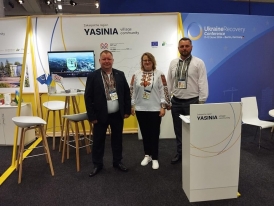

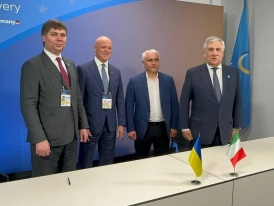
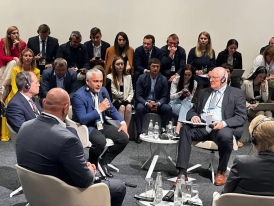
Covenant of Mayors East Board charts course for climate action in Eastern Partnership region
The Covenant of Mayors East (CoM East) Board convened its inaugural meeting on March 14, 2024, in Brussels, setting a bold agenda for climate and energy action in the Eastern Partnership region. The meeting brought together key stakeholders from the European Commission, national coordinators, and municipal representatives to address critical issues facing cities in their pursuit of a sustainable, low-carbon future.
Key outcomes of the meeting include:
- Regional Climate Targets: The Board encouraged the development of a common greenhouse gas emission reduction target for the Eastern Partnership region, balancing ambition with the realities faced by municipalities. Further consultations with technical experts and national stakeholders will refine this approach.
- Enhanced Governance: A new management structure was approved, strengthening the role of the Board and improving coordination between national and regional levels of the initiative.
- Global Representation: The Board discussed strategies to support Mayor Alexander Senkevych of Mykolaiv, who now represents the Eastern Partnership region on the Global Covenant of Mayors Board, ensuring the region's voice is heard on the international stage.
- International Engagement: Plans were initiated to showcase Eastern Partnership cities' climate achievements and needs at global forums, including the upcoming UNFCCC COP29 in Azerbaijan.
Diana Jablonska, Head of Unit at the European Commission's DG NEAR, opened the meeting, stating: "This Board meeting marks a significant milestone in the evolution of the Covenant of Mayors in the Eastern Partnership. It reflects our commitment to empowering cities to lead the charge on climate action."
The CoM East Secretariat will now work to implement the Board's recommendations, including organizing a regional practitioners' meeting to further discuss emission reduction targets and preparing for enhanced engagement in global climate initiatives.
Christophe Frering, CoM East Team Leader, commented: "Today's meeting has set a clear direction for our work in supporting Eastern Partnership municipalitues. We are excited to move forward with ambitious yet achievable climate goals that reflect the unique challenges and opportunities in our region."
Image Gallery
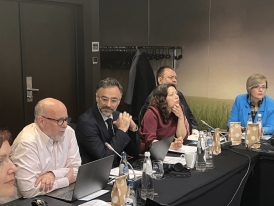
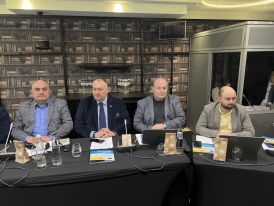
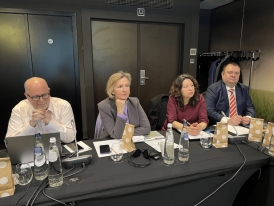


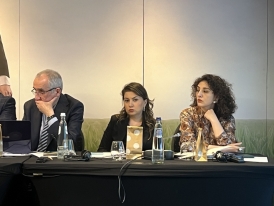
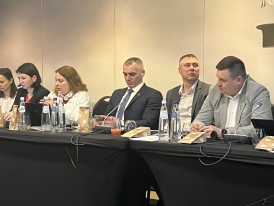
The water-related issues have garnered the attention of the Georgian Covenant of Mayors signatories
On March 28, 2028, the launch event of the "South Caucasus Regional Water Management" (SCRWM) Program commenced, focusing on the discussion of water-related issues with the participation of various stakeholders. The event was arranged as part of the USAID-funded SCRWM program in partnership with the EU-funded "CoM East| project. It brought together 32 Georgian Covenant of Mayors signatories and other stakeholders to discuss on municipal water security, sustainable water resource management, and water-related climate change adaptation.
To emphasize the crucial role of water in climate change adaptation at the municipal level, the event set three primary objectives. Firstly, to provide dialogue regarding the implications of the recently adopted Georgian Law on Water Resource Management for fostering sustainable water management within urban environments. Secondly, to facilitate knowledge exchange concerning the significance of water security and resource management in promoting sustainable and climate-resilient local development. Thirdly, to encourage the municipal governments to reflect on their needs and challenges in sustainable water resource management in the context of climate change.
The event opened with opening remarks delivered by Ms. Mzia Giorgobiani, Deputy Minister of Regional Development and Infrastructure, and Ms. Nino Tandilashvili, Deputy Minister of Environmental Protection and Agriculture of Georgia. Additionally, speeches were given by Mr. Eric Viala, Chief of the Party of the USAID South Caucasus Regional Water Management Program, representatives from the USAID Caucasus Office, and Mr. Christophe Fréring, Team Leader of the Covenant of Mayors East. All key speakers noted the critical importance of water in all its dimensions, notably emphasizing its pivotal role, particularly in addressing challenges intensified by climate change. Also, they emphasized the importance of ensuring access to water for the well-being of local populations, recognizing it as essential for sustaining livelihoods and fostering sustainable development amidst climate change pressures. In the second part of the event, the floor was given to the representatives of the municipalities where they spoke about the challenges facing g the Georgian municipalities in terms of water-related issues not only municipal and/or urban level but also in terms of solutions for disaster risk reduction, as well as efforts to enhance water security for climate change adaptation.
About the SCRWM program: South Caucasus Regional Water Management Program (SCRWM) is a 5-year regional program funded by the USAID and implemented by Deloitte Consulting LLP in the South Caucasus. Its goal is to support effective regional cooperation and water management for the promotion of regional stability and resilience through advancing stakeholder engagement and effective regional cooperation in water management in the region. Working collaboratively
with key stakeholders from relevant government ministries, the private sector, civil society, academia, and water-related institutions, the program intends to catalyze regional environmental and water management cooperation on shared priorities; support harmonization of water management policy frameworks and introduce new technologies to advance social, economic, environmental, and climate change objectives for the prosperity and stability in the South Caucasus Region.
Moldova hosts third Municipal Development Cooperation Platform meeting, advancing sustainable energy and climate action
The third meeting of the Municipal Development Cooperation Platform took place in Chișinău. It was organized within the framework of the Covenant of Mayors-East project, with the financial support of the European Union.
The topics addressed included sustainable local development, increasing energy efficiency, increasing the use of green energy as a solution to mitigate climate change and the role of local authorities in promoting sustainable energy and environmental protection.
During the meeting, challenges and solutions in implementing SECAPs were also discussed, and the most important aspects were included in the national roadmap of CoM-East regarding investments in energy and adaptation to climate change.
Minister of Energy Victor Parlicov described the Ministry of Energy's priorities relevant to local public authorities, mentioning amendments to the Law on the Promotion of Renewable Energy Sources. The document allows local public authorities to create energy communities and provides for allocating capacity quotas within the "net billing" support mechanism.
Additionally, the Minister mentioned an energy efficiency obligation scheme introduced in 2024 will feed into the Energy Efficiency Fund in Moldova's Residential sector.
"This year will be a pilot for these investments, followed by an ESCO-type investment mechanism, managed by the National Center for Sustainable Energy, dedicated to public authorities," said the Minister of Energy.
Speaking about environmental priorities, Minister Rodica Iordanov urged signatories to participate in the National Program for the Expansion and Rehabilitation of Forests, the implementation of which will make us more resilient to climate change. This result will also be possible by afforesting land within local authorities over the next ten years, subject to erosion, landslides, and unsuitable for agricultural use, as well as by rehabilitating protective forest belts for fields.
The Minister also emphasized that promoting sustainable energy and environmental protection are the main objectives of the National System for Monitoring and Reporting Greenhouse Gas Emissions. Reducing the level of CO2 locally is a major objective for Covenant signatories.
Covenant signatories reiterated the need for governmental support to achieve climate neutrality objectives.
During the event, opportunities from the "Climate City Gap Fund" were presented, which provides support to Covenant signatories. The project submitted by the municipality of Bălți to this international fund has already been selected for funding. Also, with the support of the Covenant of Mayors office, a project of the municipality of Strășeni was approved for another international program - Urban Transition Mission.
Additionally, the results achieved by 10 localities through the project "Energy-Resilient Communities for Moldova with the Support of the Diaspora and Native Associations," realized with the financial support of the German government through GIZ Moldova, aimed to reduce dependence on traditional energy sources at the local level, contribute to reducing high energy bills, and, last but not least, improve the quality of the environment.
A solemn moment was the awarding of flags and diplomas of accession to the Covenant of Mayors for four new localities: Gangura, Zaim, Coropceni, and Chetrosu.
Following the vote of those present, the new members of the Platform's permanent Group were elected on behalf of the Covenant signatories. This position was delegated to Ms. Valentina Casian, Mayor of Strășeni, President, and Mr. Alexandr Petcov, Mayor of Bălți, Co-Chair.
Last but not least, the objectives and activities of the CoM-East Action Plan for 2024 were presented.
Image Gallery
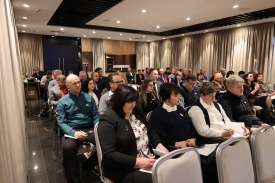
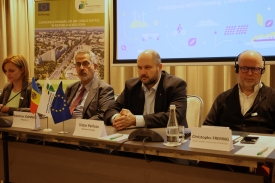
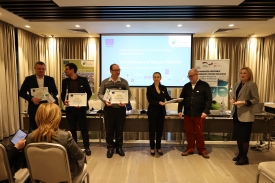
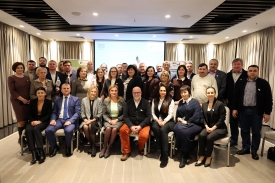
CoM East Team Leader visits Armenian communities
On April 1-2, 2024, Mr. Christophe Frering, Team Leader of the EC “Covenant of Mayors East” regional project, visited signatories of the Covenant of Mayors for Climate and Energy in Armenia and had meetings with the local administrations and staff of Talin, Parakar and Akunk communities.
This was already the second visit of the Team Leader to Armenia, after a series of meetings with communities held in October 2022, aimed at establishment of direct dialogue between the CoM East project management and the local administrations with the purpose of updating signatories on the planned project activities, calling for timely development and approval of SECAPs, encouraging to actively participate in the upcoming EU Sustainable Energy Week, as well as learning on implemented and ongoing mitigation and adaptation measures on local level.
In Talin community, one of the new CoM signatories, the meeting was held with the Mr. Artur Harutyunyan, Assistant to the Mayor and the staff of Development Programs Division, responsible for development of SECAP.
During the meeting Mr. Frering was informed about the process of amalgamation of Talin with 33 settlements resulting to a significant increase in the territory and population of the new enlarged community as well as expanding the spectrum of potential climate risks to be considered during development of an action plan.
It was emphasized that given the climatic conditions of Talin, in particular, the large number of sunny days and high solar radiation, widespread use of solar energy for electricity and heat generation was considered as the priority measure for GHG emission reduction in municipal and residential sectors. To this end, the local administration has already initiated installation of PV systems for power supply of municipal buildings and facilities such as the community pumping station. It is planned that by the end of 2025, the vast majority of municipal building in Talin and the settlements will be equipped with PV systems.
In Parakar community, the meeting was held with Mr. Gor Saribekyan, Deputy Mayor of Parakar, who updated the CoM East team on the process of SECAP development (first draft has already been submitted for evaluation of Helpdesk) and on plans of the community to take part in EUSEW 2024.
During the mission, Mr. Frering visited the municipal art school of Parakar as well as the wastewater treatment plant constructed with the support of GEF Small Grant Program and the “Water, Climate and Development in CACENA Region” DFID project. The plant serves about half of the community's population and provides mechanical and biological treatment of wastewater.
In Akunk community that joined the Covenant in February 2023, Mr. Frering met with the Mayor of the community Mr. Hunan Rubenyan. Like most of the CoM signatories in Armenia, Akunk has also been enlarged in the process of administrative-territorial reform that resulted in amalgamation of the community with 8 settlements, including three high mountain villages. Mr. Rubenyan informed the Team Leader about the ongoing projects of the local administration aimed at thermal insulation the municipal kindergartens, installation of PV systems for power supply of municipal buildings and use of renewable energy to power the drinking water supply systems of several communities.
Image Gallery
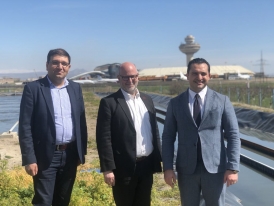

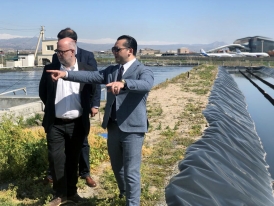
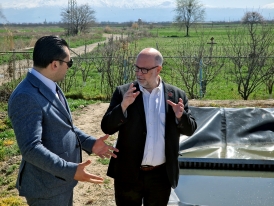
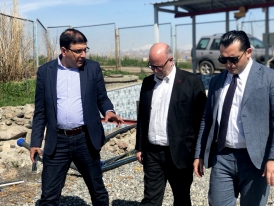
Covenant of Mayors - East project lead meets with Armenian officials to discuss climate and energy initiatives
On April 1, 2024, Mr. Christophe Frering, Team Leader of the EC “Covenant of Mayors East” regional project, met with Mr. Vache Terteryan, Deputy Minister of Territorial Administration and Infrastructures of RA (Covenant National Coordinator) and Mr. Emin Yeritsyan, President of the Union of Communities of Armenia (Covenant Supporter).
The event was aimed at informing CNC and CS about the first meeting of the CoM East Project Board held on March 14th in Brussels, discussing the activities planned within the framework of the project in Armenia and coordinating their implementation with the ministry.
In particular, Mr. Frering informed the national partners about functions of the newly established Board, acting as a regional strategic advisory, networking and coordination body for the CoM initiative in EaP countries, and about main topics discussed by the Board members, CoM East Secretariat and the invited stakeholders, such as current progress of the regional project, the plans for the project's development in 2024 and beyond in EaP countries, improved cooperation with the within the region and between the EaP and the EU, etc.
As for national level events, Mr. Frering updated the partners on organization of the third capacity building training for the Armenian signatories, planning of events and contests within the framework of the EUSEW, gathering the first meeting of the Practitioners’ Group and the upcoming visit of the group of Moldovan signatories to Armenia within the scope of “City to city” exchange program.
Mr. Yeritsyan, underlined the importance of the capacity building activities of the project, mentioning that the next training would target development and financing of project proposals, thus, helping signatories to transform local energy and climate initiatives into competitive proposals eligible for funding by international financial organizations and donors.
Mr. Terteryan thanked the project team for the work done and highlighting that the climate change mitigation and adaptation objectives of the Covenant of Mayors are consistent with the state policy in the field of climate and energy. The Deputy Minister assured that the Ministry, as the National Coordinator of the initiative in Armenia, is ready to continue supporting the implementation of the project within its capabilities and competencies, and has proposed more active communication between the local project team and contact persons in the Ministry.
Mr. Terteryan also welcomed the idea of organization of the study visit of the Moldovan delegation to Armenia, and agreed with the proposal to include into the mission agenda of the delegation a meeting with the Ministry to introduce the results of the territorial and administration (amalgamation) reforms, key objectives and outcomes of the state subvention program supporting communities with implementation of infrastructure projects and the results of liberalization of the Armenian electricity market that has opened new opportunities for local administration of communities and population for the production and use of renewable (solar) energy.
At the conclusion of the meeting, participants agreed to intensify cooperation to materialize the planned national events and prepare for the fourth meeting of the Covenant of Mayors Club in Armenia.
Climate Change Impact on Women's Vulnerability in Georgia
Written by margaryta.kamasaThe report analyses insights and experiences of diversified groups of women regarding the climate change impacts from various locations in Georgia, to enable the development of more gender-inclusive national and local climate policies. The study based on extensive interviews identifies the main factors shaping women’s vulnerability to climate change. The social determinants of climate sensitivities include opportunities for political participation, social status, income, age, access and control over the assets and others are exacerbated by climate change. The impacts in urban and rural areas vary. The report can be used as an example of a climate vulnerability analysis focused on a specific group at the national and regional levels, including the approach to data collection, analysis, and presentation of results. The recommendations developed for Georgia may be relevant for other EaP countries.
Climate Landscape Analysis for Children in Moldova
Written by margaryta.kamasaThe report presents the latest data, research and other evidence reflecting the impact of climate change in Moldova, with a particular focus on climate hazards affecting children. The research identifies the main factors contributing to the vulnerability of children and adolescents at national and regional levels, including environmental and climate change factors (location in areas most affected by climate-related natural disasters, environmental and water quality) and socio-economic factors (economic development and poverty, food and nutrition, access to health services, education levels). The report makes recommendations to stakeholders, including UNICEF's future programming, policy and advocacy. The report can be used as an example of a climate vulnerability analysis focused on a specific group at the national and regional levels, including the approach to data collection, analysis and presentation of results. The recommendations developed for Moldova may be relevant for other EaP countries.
More...
Climate (un) vulnerable: how to work with the topic of climate and climate justice. Recommendations for civil society organisations helping vulnerable groups
Written by margaryta.kamasaThe publication provides an analysis of vulnerable groups exposed to negative impacts of climate change and potential impacts of climate policies, including: women, youth, elderly people, people with disabilities, indigenous peoples, low-income people, homeless people, migrants, prisoners, rural communities, communities most affected by climate change, people and communities living in areas / working in sectors affected by climate policies. The paper examines the current state of climate justice and identifies factors that hinder or contribute to its development in these regions. The publication provides practical recommendations on how to integrate climate issues into the activities of civil society organisations (CSOs), as well as suggestions on how to integrate climate action into their strategic planning. The recommendations can be used by a wider range of stakeholders, including local governments, communities, organisations and businesses.
Ukraine, Ukrainka: Measures for energy efficiency in public buildings
Written by margaryta.kamasaThe project included the following technical measures: 1) Thermal refurbishment of the Sport Complex “Energetik”, 2)Thermal refurbishment of the Palace of Culture “Energetik, 3) Implementation of automatic system of energy monitoring software with the additional installation of the appropriate meters and special sensors for all types of energy resources for all budget institutions of the city (100% of all budget buildings).
Ukraine, Zvyahel: Installation of PV plant for the local hospital
Written by margaryta.kamasaThe project included the following technical measures: 1) Installation of 32,4 kW roof-based PV power plan (60 PV panels with capacity 540 W each), 2) Installation of auxiliary equipment (invertors, meters, cabling, etc.), 3) Development of the feasibility study for construction of the PV plan (150 kW capacity) for the municipal water supply company.

